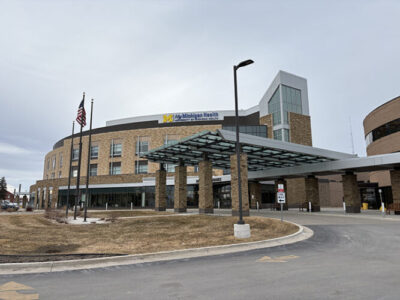Experts say to leave bird nests alone

Courtesy Photo by Ashley Kolnowski A nest full of orphaned baby birds is seen in ABC Alpena’s Bird Center’s care. ABC owner Ashley Kolnowski said that she is legally allowed to care for orphaned baby birds, but she is not allowed to hatch eggs.
ALPENA — Homeowners may start seeing birds nesting in weird spots such as mailboxes, a front door wreath, or gutters. Bird experts say that the best course of action to deal with surprise feathered guests is to leave them alone.
The Audubon Great Lakes regional office, a branch of the National Audubon Society, explains that mother birds will often abandon nests if they have been moved. So even if the nest is a nuisance to a household, the organization urges the public to take measures to ensure the safety and preservation of unhatched birds.
According to the organization, relocating nests or attempting to haze or harass birds from nesting spots is illegal if they are federally protected species of birds. To identify protected species, individuals should visit michigan.gov/dnr/managing-resources/wildlife.
Audubon Great Lakes also states that nests from migratory birds are also illegal to move or remove. These birds are protected under the Migratory Bird Treaty Act (MBTA).
Karen Tetzlaff, president of the Thunder Bay Audubon Society (TBAS), said that the best course of action when dealing with bird nests is to leave them as they are.

Courtesy Photo by Michigan Department of Natural Resources A Blue Jay is seen perching in a tree. Ashley Kolnowski, owner and founder of ABC Alpena’s Bird Center sanctuary, has helped relocate Blue Jay nests, among other species of birds.
“In general, the rule of thumb, if you possibly can … leave it,” Tetzlaff said.
If a bird has nested in a wreath on a front door, for example, Tetzlaff suggested using a side door for a time until the hatchlings have left.
According to the Cornell Lab, homeowners shouldn’t have to wait too long until the nest is safe to relocate because most songbirds’ nesting cycles (including robins) only last four weeks. That includes two weeks of incubation and two weeks of nesting.
The Cornell Lab suggests that if a homeowner must relocate a nest before the parent birds and hatchlings leave, homeowners should contact a local wildlife rehabilitation center for assistance.
Ashley Kolnowski, founder and president of ABC Alpena’s Bird Center sanctuary, stated that if individuals find a nest with eggs inside they should leave it alone.
“Once a bird has laid an egg in the nest, it should not be touched,” Kolnowski said.
However, if it is absolutely necessary to relocate the nest, individuals should contact her sanctuary for assistance. According to Kolnowski, nests can often be relocated within 5 feet of the original nesting area. Due to recent high winds in the area, Kolnowski said she’s assisted in relocating nests that were knocked down.
Though Kolnowski is not legally allowed to hatch eggs, she is able to care for baby birds if they are abandoned by their parents. Kolnowski noted that geese families are more accepting of orphaned babies and will adopt orphans and raise them alongside their own.
Currently, Kolnowski said she is caring for seven baby birds, eight adult birds, two bunnies, and two turtles. She also helps rescue cats to conserve the local bird population.
Kolnowski said she can take in all types of birds, from owls to songbirds. She helps raise babies and cares for injured adult birds. Kolnowski explained that she is working toward certification to care for eagles and is just waiting on a Michigan Department of Natural Resources (DNR) inspection before she is able to do so.
Kayla Wikaryasz can be reached at 989-358-5688 or kwikaryasz@TheAlpenaNews.com.
- Courtesy Photo by Ashley Kolnowski A nest full of orphaned baby birds is seen in ABC Alpena’s Bird Center’s care. ABC owner Ashley Kolnowski said that she is legally allowed to care for orphaned baby birds, but she is not allowed to hatch eggs.
- Courtesy Photo by Michigan Department of Natural Resources A Blue Jay is seen perching in a tree. Ashley Kolnowski, owner and founder of ABC Alpena’s Bird Center sanctuary, has helped relocate Blue Jay nests, among other species of birds.






